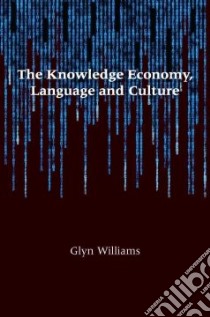The Knowledge Economy, Language and Culture - 9781847692504
Un libro in lingua di Glyn Williams edito da Multilingual Matters Ltd, 2010
- € 37.40
- Il prezzo è variabile in funzione del cambio della valuta d’origine
Together with changes in the nature of modernity, globalisation is restructuring society. The sovereignty of the nation-state is undermined, the structuring of identity is realigned and a sense of individualism (which involves a freedom of choice re institutional `alignments) prevails. English emerges as the global lingua franca. At the heart of these developments is the knowledge economy within which work is organised according to principles quite different from those of the Taylorism that prevailed in the industrial economy. Language and culture play a crucial role in the elaboration of the shared meaning that is crucial for learning within team working. The book argues that creativity is enhanced by the use of multilingualism within working practices. It concludes with an overview of how our understanding of language is also changing.
"This is another important and highly contemporary contribution by Glyn Williams. Noted for his considerable originality and independence of viewpoint, the book is remarkably interdisciplinary, with understandings from economics, sociology, philosophy, business and sociolinguistics. It attacks issues of major current importance: the future knowledge-based economy, globalisation, and the use of technology for information exchange. The book contains critical appreciation and historical analysis but is also a very modern and highly constructive approach to the knowledge economy, and to the future of language. This is Williams' best book from several decades of publishing. " Colin Baker, University of Bangor, Wales
"Williams' latest book offers a thoughtful, original and often provocative interpretation of the mutual relationships between the linguistic, the political, the social and the economic. The line of argument weaves together notions that are all too often considered in isolation, and this book can be recommended to advanced students and specialists of language policy and the politics of language who seek access to the big picture, along with wide-ranging scholarship and genuine intellectual engagement." Francois Grin, Universite de Geneve, Switzerland
Informazioni bibliografiche
- Titolo del Libro in lingua: The Knowledge Economy, Language and Culture
- Lingua: English
- Autore: Glyn Williams
- Editore: Multilingual Matters Ltd
- Collana: Multilingual Matters Ltd (Paperback)
- Data di Pubblicazione: 15 Marzo '10
- Genere: SOCIAL SCIENCE
- Argomenti : Knowledge management Information technology Language and culture
- ISBN-10: 1847692508
- EAN-13: 9781847692504


